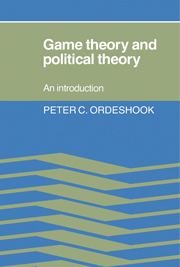Book contents
- Frontmatter
- Contents
- Preface
- Acknowledgments
- 1 Individual preference and individual choice
- 2 Individual preference and social choice
- 3 Basic theory of noncooperative games
- 4 Elections and two-person zero-sum games
- 5 Nonzero-sum games: political economy, public goods, and the prisoners' dilemma
- 6 Institutions, strategic voting, and agendas
- 7 Cooperative games and the characteristic function
- 8 The core
- 9 Solution theory
- 10 Repeated games and information: some research frontiers
- References and a guide to the literature
- Index
4 - Elections and two-person zero-sum games
Published online by Cambridge University Press: 21 March 2010
- Frontmatter
- Contents
- Preface
- Acknowledgments
- 1 Individual preference and individual choice
- 2 Individual preference and social choice
- 3 Basic theory of noncooperative games
- 4 Elections and two-person zero-sum games
- 5 Nonzero-sum games: political economy, public goods, and the prisoners' dilemma
- 6 Institutions, strategic voting, and agendas
- 7 Cooperative games and the characteristic function
- 8 The core
- 9 Solution theory
- 10 Repeated games and information: some research frontiers
- References and a guide to the literature
- Index
Summary
Chapter 3 has provided us with the general structure of the theory of noncooperative games, but we cannot gain a sense of the theory's relevance to politics simply by admiring its internal logic. And although it is tempting to consider examples, we must be careful. Too often the apparent applications of game theory to politics take the simplistic form, “Let player 1 be the U.S. with two strategies and let player 2 be the USSR with two strategies....” Such examples illuminate the general structure of games and reveal the strategic commonality of substantively distinct situations. But a theory of politics requires that we move beyond simple “stories” to modeling specific institutions and processes in a sustained way.
This chapter reviews one such effort, the modeling of plurality-rule elections, which compels us to focus on a particular class of noncooperative games, zero-sum games, the most widely studied and applied class in games theory. Chapter 3 contains all the conceptual ideas that we require to construct and analyze a zero-sum game. Nevertheless, because the zero-sum assumption imposes specific restrictions on individual utility functions, we can prove some important additional results about equilibria for games that utilize this assumption. After reviewing those results, we turn to the specific application of two-candidate elections. There, we examine alternative specifications of candidate objectives, conditions for the existence of equilibria in single and multi-issue contests, elections that concern income redistribution, elections in which the information of various participants is incomplete, and finally, multicandidate elections. Here, then, we begin to see the development of a consistent body of theoretical knowledge about an important institution.
- Type
- Chapter
- Information
- Game Theory and Political TheoryAn Introduction, pp. 144 - 202Publisher: Cambridge University PressPrint publication year: 1986



